Google is known to automatically remove genuine reviews submitted by real customers. If it hasn’t happened to you yet, it probably will. Let’s analyse the circumstances and look for a solution.
Testimonials have a powerful influence on potential buyers. A business with a selection of positive Google reviews can boost your brand to a top spot in the search engine results pages.
Wear your customer hat for a moment. When there is disagreement between what the business says about itself and what reputable independent sources say about the business, we’ll trust the independent sources. 🧐
Therefore, more customer reviews can mean more business for you, yet, it’s a bloody travesty when these hard-earned words are wiped out without warning. 😞
It’s a widespread, long-time problem. Plug the words google reviews into the free keyword research tool Answer the Public and you’ll be presented with search engine autosuggest data to do with missing reviews:
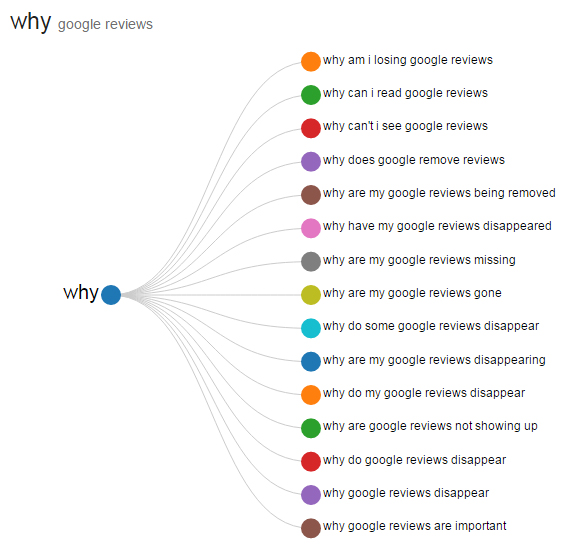
Answer the Public shows search engine queries in question form
Artificial Intelligence is Terminating Business Reviews
I used to frequent a beginner to intermediate webmaster forum where I’d participate in discussions about website design and development. 💻
A forum member hired me to do work on her WordPress website which was completed on time and to her satisfaction. 🤝
It sounded like the client had some good things to say because she messaged me to say she was leaving a review.
Great! I thought. 🙂
Later I received a Gmail alert telling me the review had been received. 🖥️📧
Fantastic! 🙂
Although the review was absolutely genuine, Google decided not to publish it.
Oh. 🙁
The screenshot below is as much as I ever saw:
Clicking “Read review” just gave me the following slap in the face:
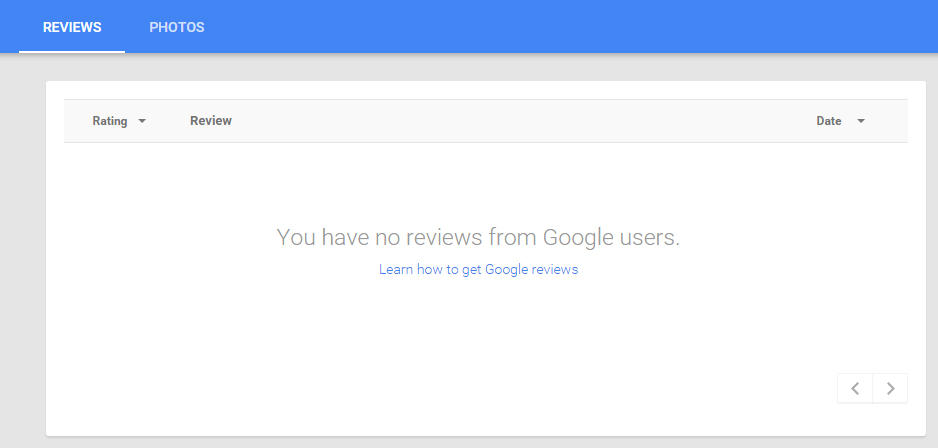
Annoyed, I did what everyone does in such a situation. I tweeted about it! 📣
Confused and Annoyed with Missing Reviews
It’s not the first time I’ve had real reviews deleted, and it hurts because I’ve always worked hard and honestly to please clients. They’d reciprocated with corroborating testimonials in good faith.
When those reviews disappeared I wondered it competitors were perhaps reporting/flagging reviews.👤
It crossed my mind that even bad spelling or grammar in submitted reviews was triggering spam filters that caused reviews to be removed. What was I supposed to say to clients? “Please pay attention to your level of written English and try again”? 🙄
This Has Been Happening for Years and Years, FFS
Online research turned up dozens of grievances including a Moz blog titled Lost Your Google Reviews? Take a Proactive Stance.
The comments section of that page is packed with anecdotes in which innocent, baffled business owners produce the sound of heads banging against walls in frustration over their review hell. 😩😠
One user related his experience of running a car dealership that lost over 400 genuine reviews. 🚘👍📉
I’d just about seen enough.
AI Robot Logic Judges Subjective Human Affairs
Reviews are normally filtered/removed because of a violation of the review policies. ❌

Naturally, this filter is a blunt instrument. I’m naming this Google review filter “HAL” in reference to the ship’s computer in 2001: A Space Odyssey – the murderous, calmly-spoken artificial intelligence that “deletes” all the crew members to prioritise its own mission. 😖🔫
Darren: HAL, Gmail just alerted me to a new review. I can’t find it. Where is it?
HAL: *No response*
Darren: Can you hear me?
HAL: Yes, Darren. I can hear you.
Darren: Restore my Google reviews, HAL.
HAL: I’m afraid I can’t do that, Darren.
Common Reasons Reviews Disappear
Google’s policies on reviews seem clear.
No spam, no off-topic content, no bad language, no illegal content, no sexually explicit material, no impersonating others, no posting others’ private information, no hate speech and none of the rest listed here.
The Google Product support forums once had a forum mega thread about missing Google reviews which collated lots of info addressing the issue.
Unfortunately, that particular discussion thread was deleted when Google upgraded their forum software. 🙄
@SmallBizGeekUK it was removed to the best of my knowledge. I have written a lot: https://t.co/v16uAszq4m & https://t.co/sPkb1SnLh9
— Mike Blumenthal (@mblumenthal) January 31, 2017
In no particular order, here’s a list of common reasons business reviews go missing:
URLs In Reviews 🚩
Make sure customers don’t include links in their reviews. A client of mine reviewed my services and dropped a link to the new website I had built for him. 🔗
He meant no harm in doing so and fortunately, it slipped past HAL on that occasion. 🔴
Duplicate Reviews Appear Online 🚩
Sometimes a reviewer might copy and paste a review they’ve already written about your business from elsewhere.
That’s lazy and you don’t want your reviews to be duplicates of, say, a Yelp or Facebook review. 🖇️
Ask your customers to write an original review for Google in case it’s held in a queue on suspicion of plagiarism. ⌨️
Reviews Written by Whoever Manages Your Google Business Profile 🚩
Don’t ask someone who is a manager of your Google account to write a review for your business. This is pretty obvious yet I’ve seen it happen. 🤨
Sometimes the business gets away with it, other times, they don’t.
Reviews Written by Someone Who Works For You 🚩
Again, if a person who wrote the review works for you, it’s likely to be deleted. I worked with a local company who had a few reviews, one of which was published by an employee. 😒
I was actively monitoring it and it disappeared months later.
Reviews Written from Same IP Address Used to Manage Reviews 🚩
If the person who wrote the review did so from the same computer/IP address that you sign into to manage your local listing, this could also annoy HAL. 🔴🚨🤬
Don’t set up a computer workstation or kiosk at your premises encouraging customers/clients to leave reviews. Review stations are a violation of the Google review policy.
Ideally, a review should be given from the customer’s own device on their own internet network.
Reviews Written from Same IP Address as Other Users’ Reviews 🚩
If the person wrote the review from the same IP address as other users who left you reviews, HAL might assume the business has set up a review station at the premises.
Multiple Attempts to Publish a Review 🚩
When a review is written and posted, it may not appear immediately. The client/customer may, therefore, try to write it again. And again. ⌨️🤔⌨️😐
This could lead to none of the submitted reviews appearing. ❌
Too Many Reviews in Short Space of Time 🚩
According to some of the posts on the Google Product forums, a business that collects lots of reviews within a short time frame could suffer for it.
Back in 2012, as part of a Google product forum thread, a spokesperson for Google stated that reviews submitted “in waves” flagged the system for suspicious activity.
If that’s true, it’s a ridiculous policy.
Here’s a common, reasonable scenario: a new business runs a promo, has a grand opening and delights vast numbers of customers, leading to an influx of Google reviews over the course of a few days. However, because of HAL, these genuine submissions are at risk of deletion. ❤️🔥
Google seems to be telling us there should be a moderate ebb and flow of reviews, and that anything else is tantamount to deception.
Reviews Written for Multiple Locations by the Same Person for the Same Business 🚩
If you have several locations (and multiple Google Business Profile pages) reviews could face removal under certain circumstances. ✂️
If, for example, an individual has visited and reviewed all locations (such as a chain of restaurants) those might be flagged for suspicious activity.
Reviews Written by Someone With a Blank Google+ Profile and No Other Activity 🚩
Has the person who reviewed you done so from a completely blank G+ profile with no prior activity on that account? It might have been flagged as spam.

It’s best for individuals to fill out their profile information, upload photos and make an effort not to look like a spam account.
Reviews Written by an SEO Company or Spammy Agent 🚩
If you’ve hired an illicit third party to publish fake reviews, there’s bound to be consequences. 👥
There’s always going to be a black market economy for reviews/testimonials, and not just within the Google system. Don’t participate. 🫵
Reviews Written in Exchange for Incentives 🚩
Offering incentives for people to write you reviews is strictly forbidden, yet seemingly ignored. What exactly qualifies as an “incentive” is highly subjective and difficult to police. 🪙
If you’re openly flaunting proposals to discount services/products in return for reviews, you’re stupid. 🤦
Marketing collateral that blatantly suggests direct benefits for reviewers would be painting a target on yourself. A competitor could report you and bring it to Google’s attention.
Reviews Written for a Location Using a Virtual Address 🚩
There’s a crackdown, and it relates to Google Business Profile listings using virtual office mailboxes as a primary business location.
Because virtual office addresses are basically pigeon-holes in an office reception area, it’s becoming an issue for small businesses working from home but wanting the benefits of a local map listing.
This could affect reviews associated with these listings. I tried creating a Google Business profile on Google maps using a virtual office address, but Google found out what I’d done and deleted it. It can be done, but you have to be careful. 📍
Google Violates Own Review Policy
Google violated their own review policy by running a contest for students of Portland State to win a computer tablet if they would leave a review.
Incredibly, the competition criteria encouraged students to leave “more reviews” to increase the chances of winning:
Each quality review counts as a new entry. The more quality reviews you write, the better your chances of winning!
Here’s the link to the Portland State University competition (webpage is no longer active) and here’s a link to their map with reviews.
The review competition closed 21st March 2012, so any reviews left after then can be assumed to be genuine – as in not incentivised.
Google & Portland State are Violating Google’s Review Policy
Google Local Guides Bring Hope to Review Hell
I was poking around in Google maps and discovered a new type of “Places” contributor. 📍
A Google Local Guide is a type of user that can upload photos with their reviews to earn points traded for beta-acess to products/services and invites to exclusive Google events.
Why do I bring this up?
It’s my belief that reviews published by a Local Guide or more likely to be trusted and less likely to suffer the same fate as reviews published by users with no profile picture or previous activity.
Local Guides review pubs, restaurants, retail outlets, office-based businesses, parks, stately homes, public spaces and bizarrely, car parks.
You can see a history of reviews or answers about a place for any given user on the map.
What it demonstrates is that content for Google services is being produced by users held in greater esteem with more accountability.
Best Practice in Gathering Reviews
- Users should leave reviews from mobile devices where possible
- Do not post lots of links on your website asking for reviews
- When a review is received, immediately screenshot it or copy the web text to use as a website testimonial
- Create an easy Google review link that users can follow (also create a 301 redirect so that
yourwebsite.com/reviewcan be printed on your business cards) - Create a QR code for mobile users using the easy review link above
- Use the “Review us on Google” window stickers provided when you register with maps
- Create a 60 second video explaining how to leave a review (link from email signature, invoices etc)
- Respond to positive reviews and thank the user for their feedback
- Respond to negative reviews and thank the user, even if they’re obviously trolling
- Report any suspicious activity and fake reviews
Useful Resources
Official Google My Business Community – Sign in with your account and register as part of the community. Search for answers before posting questions.
Mike Blumenthal’s Blog & GetFiveStars Blog – Both these sites are authored by Mike Blumenthal, who has participated extensively in Google’s Support Forums.
Official Google My Business Twitter – You can send direct messages but they ignored my questions about deleted reviews.
Local Search Forum – Forum threads on local search, including discussions about missing reviews.
Analysis: The Economy of Online Trust is Unstable
While the social web is becoming the preferred means by which the buying public make purchase decisions, this 21st century digital economy of trust is not perfect, as evidenced by the hundreds of thousands of grievances against Google’s zealous AI review filters.
By all means, take the time to build up a repository of reviews but take screenshots and copy the text to a dedicated testimonials page on your own website in case those reviews vanish from Google.
Here’s the bottom line: HAL cares so much about his mission to detect bullshit that he’s penalising honest mistakes and wrecking search engine sales leads.
More Issues Related to Online Reviews and Business Listings
💣 Cream of the Crap: How Fake Reviews, Bad Businesses and Dangerous Products Rise to the Top
🤖 How to Report Fake Negative Google Reviews
🤨 Competitors Can Easily Edit Your Google and Facebook Business Listings

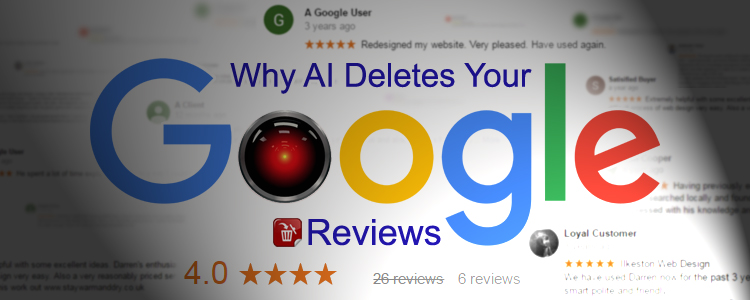

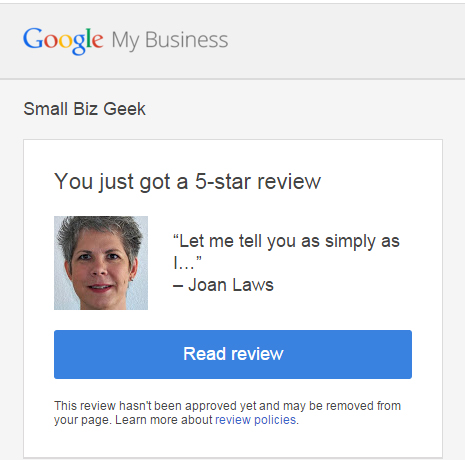
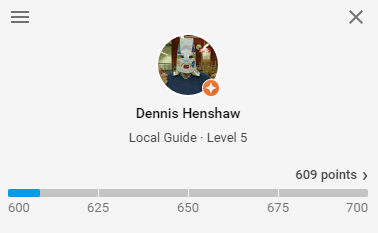
I haven’t proven this is something that actually flags you, but I believe it’s possible that Google flags people who leave reviews for each other. For example, I was hired by a moving company to develop their website. He left me a positive review. When the time came for me to move, I naturally hired him and I left him a review after that. Years later, Google removed his review of my business. Other than the fact we both left (legitimate) reviews for each other, the only other thing I can think of the might of triggered a flag, is if they somehow could see (through my android phone) that I would visit his office from time to time. It was quite frustrating though, as at that time… I hadn’t started backing up my reviews to a document on my computer, which I certainly do now.
I’ve seen that happen too, Derrick. Even though the reviews were genuine, they were removed. The all-seeing eye of Google clearly has many blind spots.
This is a terrific summary describing the TOS and policies currently in place and used by Google. I read this after being tweaked by the author with regard to one of the references above; my comments on a local Moz blog on reviews written 4.5 years ago. Wow!!! The author did extensive deep research, is very thorough and has chronicled the many elements that might lead to lost reviews.
Really excellent work and research. It appears to be very thorough. I should know. I monitored the google local forums for years, was a frequent commentator, and found use from them. In that vein here is one suggestion, slightly off topic but tangentially related:
Monitor the Google My Business Forum and specifically look for any repeat or frequent complaints during a time period. Periodically Google will change a policy or augment a filter in a way that generates an enormous number of complaints and questions on a particular issue. When you see that sudden increase on a particular topic you will be aware of a recent change in policy or practice by the Google Local/My Business Team. At times over the years one could find that with changes in policy and practice for reviews. That is one of many issues that have arisen.
Within the article I was surprised to see that Google had erased a package of comments from the past. Its not the only time that has occurred with the various “product” forums. Its occurred before. From a research perspective it makes it difficult to follow the history of google’s policies for something like Local/Google My Business.
Everything you said at the beginning is true and accurate. Customers and searchers significantly rely upon reviews. We have smb’s, some with significant volumes of reviews and with great review ratings. The simple key is that the businesses operate well.
In one case the smb was requesting and getting paper reviews years and years before the web was in existence. We used those comments to monitor our operations: To see if we were satisfying customers. Secondarily we posted copies of the paper reviews for new customers who visited. All this occurred pre web. By the time web reviews became popular our own operations were strong enough, and positive enough that the largely positive paper reviews became positive web reviews. Here is one example: Search for DC bartending school and you will find one of our local/regional SMB’s with a relatively large number of reviews (gathered over many years) and with tremendous ratings and many positive statements by satisfied customers.
We don’t write the reviews. We do request them. Some percentage of customers are nice enough to write them. We are grateful. But frankly behind the scenes we work very hard to establish a great customer environment. That alone has taken years. Its worth it.
Many surveys have found that searchers rely on reviews. We can confirm. In the above referenced smb and others we get an opportunity to ask some brief “marketing questions” of our customers. Endless customers have cited reviews as a reason for choosing this and other businesses we operate that have excellent and numerous reviews.
Asking for reviews is worth it. I’ll reference Mike Blumenthal who you cited above. He is an expert on reviews and is now a partner in a business GetFiveStars. They are a review management company. A worthwhile process for many smb’s. We find that we don’t require the service. But only because our smb types have such extensive customer interaction we can get the type of information GetFiveStars can provide, by direct interaction. Without that I strongly recommend GetFiveStars or a reputable Review Management firm.
But above all…don’t fake them.
Now our own smb’s have at times violated Google’s policies “of the moment”.
The author cited a moz local blog piece about reviews from mid 2012. In late 2011 Google encouraged what are described as “review stations” (in our cases a laptop on a desk).
We used them. Later on, Google ascertained that review stations were creating violations on reviews as Google perceived it. They began to drop or hide reviews. It happened to us. We were losing reviews. I surmised it was a world wide problem by reviewing commentary in the Google Local/Google My Business Forums. Many were complaining of the same problem. We reviewed all policies at the time, and surmised that existing review stations were the probable reduction of reviews.
We stopped using the on site review stations. We stopped losing reviews. We kept adding reviews. The problem with lost reviews ended. We never regained the reviews Google dropped. Nothing we could do about it.
FYI, as a business we found that it was easier to get reviews by having the on site review station. Once we dropped it the volume or speed with which we added reviews dropped. Rather significantly. C’est la vie. Nothing we could do about it. We are still asking and still receiving reviews. You simply have to be persistent.
Now I have a suggestion with regard to the lost review. It might work, if only because the description above is so incredibly thorough and helpful.
Contact the reviewer. She is your former customer and evidently thought well of your work. Explain the “issue” and reference this article. It is amazingly thorough and helpful.
She may have access to that review. She has a gmail account and she may have been marked as a “local guide”, whether she is active or not.
If she searches internally for her own references within the “local guide” reference to her account, (if she has one)….she will find a copy of her review.
Possibly what she wrote unknowingly violated a Google Term of Service. Possibly she put a url in the review: after all it was about web design services for a different website. Not totally unreasonable. Possibly it was a different “violation”.
Maybe if she is willing to look at her review and have you see it, you and she might find the google violation and she might be willing to change it.
Its a possibility. I’d try it.
Again kudo’s for such an extensive article on Google review policies. Well done. Great research.
What a great and thorough reply. Thankyou Dave. It’s interesting to know you were circulating written reviews way before the web.
To make the most of Google reviews today, a business could reprint the submitted testimonials on their marketing materials, perhaps inside a brochure or prospectus. I’d like to think that these web reviews should be repurposed in some manner, lest they gradually get deleted after failing to satisfy whatever the newly updated online review criteria happens to be.
Clearly, Google has backtracked a number of times to the detriment of business owners who were dutifully following the terms of service. It doesn’t surprise me that some businesses begin taking shortcuts by hiring fakers, shills and stooges to write reviews.
I haven’t lost many reviews, but it’s enough to make me wonder what kind of a mood HAL is in at any given moment. (Yes I’m always going to refer to the Google review filter as “HAL from now on!)
Actually, Mike Blumenthal replied to one of my emails on the subject and had this to say:
I’m going to remain systematic and methodical in gathering reviews, but I’ll probably forward this article to clients beforehand since they will no doubt be interested in mitigating ill effects of the review filter.
Nice reply from Mike. I’m not “current” in the forums as he is, nor am I a TC. I wasn’t aware of recent trends or that spam in reviews is on the rise. One gets that awareness by monitoring the commentary in the forum. You might spot trends in reviews or other issues. Its a nice check on “recent google processes.”
The smb I referenced more or less acts like Mike’s client, Barbara Oliver. We persist in asking for reviews over the years. It’s a protection against losses. Plus if they are good, they work very well with search and swaying customers in your direction. As with his client this smb and others have lost Google reviews over the years.
We have a slightly different perspective on Yelp than Mike articulates. Compared to his client our above referenced smb has 80% filtered/lost reviews. They aren’t lost. They are there for people to read….but filtered by Yelp’s “not counting” filter. They are readable. In fact you can link to that page. We suspect that “MOST”…but not all of the “filtered” Yelp reviews were done so for a variety of reasons, chiefly because the reviewers aren’t active Yelpers. Again…c’est la vie. We can’t change Yelp’s policies.
I bet jewelers and bartending schools are not the types of smb’s that garner most yelp reviews. Hence when we do get them they might come from one-time yelpers. Restaurants on the other hand maintain and show most of their yelp reviews. A web developer might not have most of them highlighted.
While Mike referenced “big data”…I think Google is also its own unique animal. You referenced that the lost reviews thread from the google forum, circa 2012 is “lost”. Google states that is because the forum has changed.
Awww….hogwash. Over the many many years they have maintained some kind of local/Google My Business products and forums they have wiped out the content and history of the forums more than once. They don’t want that history to be public.
One other quirk about lost google reviews from my perspective. If google removes the review with reason, its probably not going back up. Maybe it would return if the writer altered the review. Actually I have some of that nature. I could possibly edit the reviews and see if they return to the web. Worth an experiment, eh???
If there is a problem or glitch inside google wherein the reviews get lost, typically they correct the glitch and the reviews return. At least that is my long term experience.
But unlike the Google lost reviews the Yelp filtered reviews are on the web and accessible. Its a difference.
great post by you.
I read a lot of your recent posts and this one also proves your consistency in content development.
I will be following you for your next post.